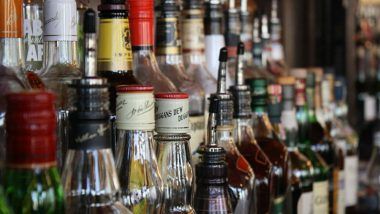London, May 6: Ensuring less availability of alcohol is one way to reduce its consumption effectively, say researchers while suggesting that people are more likely to opt for non-alcoholic drinks if more of them are available than alcoholic drinks. Fact Check: Liquor Home Delivery in Mumbai and Navi Mumbai? Don't Fall for the Phishing Calls by Fraudsters.
The study by NIHR Bristol Biomedical Research Centre and the Universities of Bristol and Cambridge in the UK found that when presented with eight drink options, participants were 48 per cent more likely to choose a non-alcoholic drink when the proportion of non-alcoholic drink options increased from four (50 per cent) to six (75 per cent).
When the proportion of non-alcoholic drink options decreased from four to two (25 per cent), participants were 46 per cent less likely to choose a non-alcoholic drink, the findings, published in the journal BMC Public Health, said.
"To our knowledge, this is the first study to demonstrate that increasing the availability of non-alcoholic drinks, relative to alcoholic drinks in an online scenario, can increase their selection," said study researcher Dr Anna Blackwell.
For the results, participants in the study completed an online task in which they were presented with a selection of alcoholic beer, non-alcoholic beer and soft drinks.
The drink selections included four alcoholic and four non-alcoholic drinks, six alcoholics and two non-alcoholic drinks, or two alcoholic and six non-alcoholic drinks.
As many as 808 UK residents with an average age of 38, who regularly consumed alcohol, participated in the study.
When presented with mostly non-alcoholic drinks, 49 per cent of participants selected a non-alcoholic drink, compared with 26 per cent of participants who selected a non-alcoholic drink when presented with mostly alcoholic drinks.
These results were consistent, regardless of the time participants had to make their decision, indicating that the findings were not dependent on the amount of time and attention participants were able to devote to their drink choice.
The findings suggest that interventions to encourage healthier food and drink choices may be most effective when changing the relative availability of healthier and less-healthy options.
The authors caution that as the study measured hypothetical drink selection online, results may differ in real-world settings.
Further studies are needed to determine how the relative availability of non-alcoholic and alcoholic drinks impacts the purchasing and consumption of alcohol in real life, they noted.
(The above story first appeared on LatestLY on May 06, 2020 08:15 PM IST. For more news and updates on politics, world, sports, entertainment and lifestyle, log on to our website latestly.com).













 Quickly
Quickly


